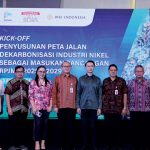Jakarta (Greeners) – WWF Indonesia and Earth Hour communities in 30 cities call out for Indonesian president, city leaders, local administrations, companies, and public, especially young generation to use public transportation to reduce greenhouse gas emission.
Through Earth Hour 2019, WWF aims to reach to more than five 5millions of young people to adopt with green and sustainable lifestyle by 2020.
Rizal Malik, CEO of WWF Indonesia, said Earth Hour movement is different from previous movement of switching lights as the symbol.
The important message is the change to green lifestyle. The target of Earth Hour is to reduce emissions from transportation.
“Switch off is just symbolic, the important [message] is to remind us on necessary electric consumption and will influence on our own lifestyle in the future,” said Malik. “This year, we are encouraging public to use mass transportation because transportation sector is one of factor for greenhouse gas emission increase,” said Malik in Jakarta on Wednesday (27/03/2019).
READ ALSO: Ministry of Environment and Forestry to Increase Environmental Quality Index in Indonesia
Based on Handbook of Energy Economic Statistic of Indonesia 2018 by Energy and Mineral Resources Ministry, energy consumption in transportation sector in 2007 is 29 percent, increase to 47 percent in 2017.
In addition, the ministry’s Data and Energy Information Technology Center, transportation sector contributes to 1.28 million tons of emissions, with 6.7 percent of increase per year in average.
Malik said Earth Hour is a moment to rehabilitate the connection between human and nature, to prioritize environmental sustainability in the nation and local agenda.
Indonesian government is committed to reduce greenhouse gas emission 29 percent by 2030 and 11 percent coming from public transportation. Hence, public needs to participate by using public transportation.
“Hence, we are cooperating with MRT and Transjakarta on how to make public to use public transportation and stop using private vehicle,” he said. “The impacts [are] no traffic jams, energy efficiency and public can use comfortable and punctual public facilities.”
READ ALSO: Indonesia Faces Challenges for Its Organic Fuel Implementation
Agung Wicaksono, director of Transjakarta, said that CO2 emissions from transportation contributes up to 46 percent for cities, in particular using private vehicles. Transjakarta is struggling to facilitate people to ride mass transportation by integrating the routes and bus stations with MRT, LRT, and the trains. Feeder routes from housing complex areas in the south to Lebak Bulus and Fatmawati to extended routes from MRT in the middle of the city, such as Dukuh Atas and HI.
“In the future, to reduce emissions, we will test electric mobility beforehand and will be used next year,” said Wicaksono.
To support Earth Hour 2019, MRT Jakarta secretary division head, Muhammad Kamaluddin, said MRT Jakarta is committed to reduce global warming impacts. MRT Jakarta has been actively engage with Indonesians to adopt green lifestyle by shift from private vehicles to public transportation and to implement energy efficiency to reduce greenhouse gas emissions.
“To support Earth Hour, we are planning to switch off one light in one of the corners of our 13 stations on 30 March 2019, from 8.30 pm to 9.30 pm, and it is guaranteed will not be affect security and safety. So, we have taken into considerations which corners are safe to be switched off and this is as our support for Earth Hour 2019,” he said.
Reports by Dewi Purningsih



















































